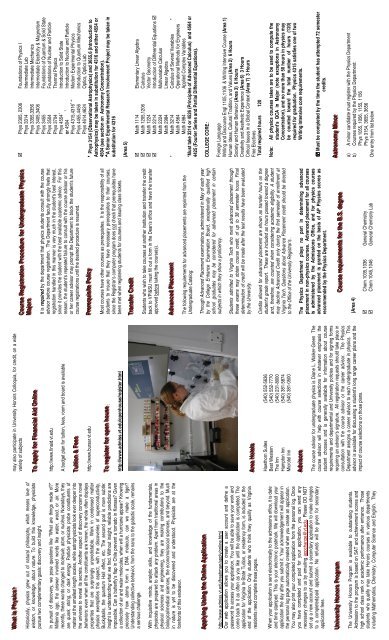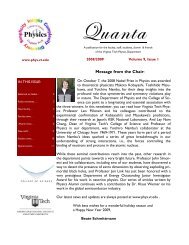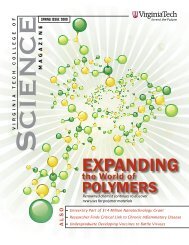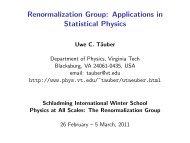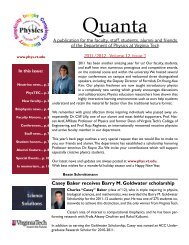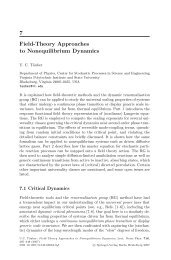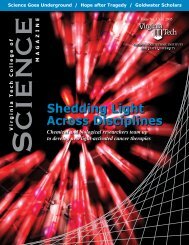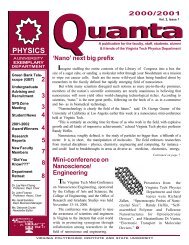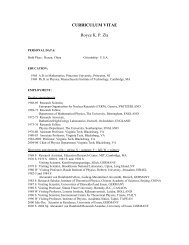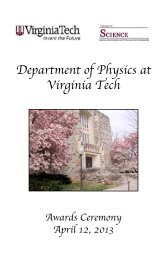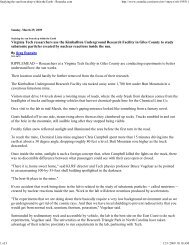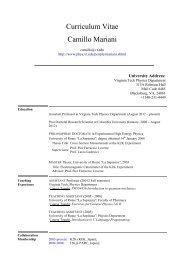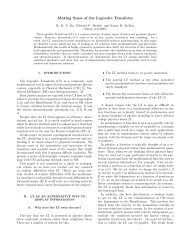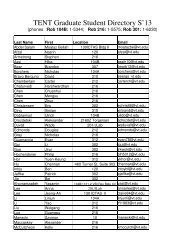WWW hhh aaa ttt iii sss PPP hhh yyy sss iii ccc sss AAA ppp ppp lll ...
WWW hhh aaa ttt iii sss PPP hhh yyy sss iii ccc sss AAA ppp ppp lll ...
WWW hhh aaa ttt iii sss PPP hhh yyy sss iii ccc sss AAA ppp ppp lll ...
You also want an ePaper? Increase the reach of your titles
YUMPU automatically turns print PDFs into web optimized ePapers that Google loves.
Whhaat tt iiss i PPhhyyssi iiccss ??<br />
Historically, physics grew out of natural philosophy, which means love of<br />
wisdom, or knowledge, about nature. To build this knowledge, physicists<br />
pursue two complementary goals: discovery and insight.<br />
In pursuit of discovery, we pose questions like “What are things made of?”<br />
Millennia ago, the answer involved words like water, wood, or air. More<br />
recently, these words changed to molecule, atom, or nucleus. Nowadays, they<br />
are quark, string, or dark energy. Particle physicists probe constituents of<br />
matter at the smallest length scales, while astrophysicists look ever deeper into<br />
the universe to reveal its secrets. Another aspect of discovery concerns novel<br />
behaviors: even when all the constituents are known, the whole often displays<br />
properties that are surprisingly unpredictable. Work in condensed matter<br />
physics exemplifies this aspect, with the discoveries of superconductivity,<br />
Buckyballs, the quantum Hall effect, etc. The second goal is more subtle:<br />
Insight is understanding what we find. Without insight, reliable predictions are<br />
impossible. Can a butterfly’s flap in Chile prevent a tornado in Kansas? Given<br />
a collection of air and water molecules, when will a hurricane appear? Knowing<br />
precisely how atoms form a DNA molecule, can we make a tiger?<br />
Understanding collective behavior, from the nano to the galactic scale, remains<br />
a serious challenge.<br />
With inquisitive minds, analytic skills, and knowledge of the fundamentals,<br />
physicists are prepared to attack any problem. Apart from traditional areas in<br />
physical sciences and engineering, they are making contributions to the<br />
biological/medical sciences, the economic/social sciences, and beyond. Much<br />
in nature is yet to be discovered and understood. Physicists are at the<br />
forefronts of this endeavor.<br />
AA<strong>ppp</strong>pl llyyi iinngg UUssi iinngg tthhee t OOnnl lli iinnee AA<strong>ppp</strong>pl lli iiccaat tti iioonn<br />
http://www.admiss.vt.edu/freshman/apply/online.html<br />
Our web application allows you to create a user account and define a<br />
password to access your application. You will be able to save your work and<br />
come back to it as often as you like until the application is completed. The<br />
application for Virginia In-State Tuition, or residency form, is included at the<br />
end of the application. Only students who think they qualify as Virginia<br />
residents need complete these pages.<br />
When your application is sent electronically to the admissions office, it is date<br />
and time stamped. This is your electronic postmark. We will download your<br />
application the day after you submit it. Your acknowledgement will appear in<br />
the personal log page automatically created when you create an application.<br />
You may also print your completed application from the personal log. Once<br />
you have completed and paid for your application, you can send any<br />
necessary changes to us by emailing appchange@vt.edu. Please DO NOT<br />
set up a new account and submit a secondary application to make changes<br />
to a completed/paid application. No refunds will be given for secondary<br />
application fees.<br />
UUnni iivveer rssi iit ttyy HHoonnoor rss PPr rooggr raamm<br />
The University Honors Program is available to outstanding students.<br />
Admission to the program is based on SAT and achievement scores and<br />
high school class rank or academic performance after entrance. Those<br />
students who qualify may take Honors courses in various departments<br />
including Mathematics, Chemistry, Computer Science and English. They<br />
may also participate in University Honors Colloquia, for credit, on a wide<br />
variety of subjects<br />
TToo AA<strong>ppp</strong>pl llyy ffoor f r FFi iinnaanncci iiaal ll AAi iidd OOnnl lli iinnee<br />
http://www.finaid.vt.edu<br />
A budget plan for tuition, fees, room and board is available<br />
TTuui iit tti iioonn && FFeeeess<br />
http://www.bursar.vt.edu<br />
TToo reeggi r iisst tteer r ffoor f r ooppeenn hhoouussee :<br />
http://www.admiss.vt.edu/openhouse/register.html<br />
AAr reeaa HHoot tteel llss<br />
Hawthorn Suites (540) 552-5636<br />
Best Western (540) 552-7770<br />
The Inn (540) 231-8000<br />
Hampton Inn (540) 381-5874<br />
Microtel Inn (540) 381-0500<br />
AAddvvi iissoor rss<br />
The course advisor for undergraduate physics is Diane L. Walker-Green The<br />
course advisor will help with course selections in whatever emphasis the<br />
student chooses and is generally available for information about course<br />
requirements and departmental and University policies and for signing forms<br />
requiring an advisor's signature. All registration requests should take place in<br />
consultation with the course advisor or the career advisor. The Physics<br />
Department assigns a career advisor to each undergraduate in physics. This<br />
advisor is available for discussing a student's long range career plans and the<br />
impact of course selections on those plans.<br />
CCoouur rssee RReeggi iisst ttr raat tti iioonn PPr roocceedduur ree ffoor f r UUnnddeer rggr raadduuaat ttee PPhhyyssi iiccss<br />
MMaaj jjoor rss<br />
It is required by the department that physics students consult with the course<br />
advisor before course registration. The Department faculty strongly feels that<br />
registration handled in this manner is very much in the student's best interest,<br />
since it provides the student with the best available academic advice. For this<br />
reason, the student's repeated failure to consult with the course advisor or his<br />
or her career advisor may prompt the Department to block the student's future<br />
course registrations until the desired procedure is resumed.<br />
PPr reer reeqquui iissi iit ttee PPool lli iiccyy<br />
Most courses have other courses as prerequisites. It is the responsibility of all<br />
students to insure that they have necessary prerequisites to their courses,<br />
since the Registrar's computer program does not check that prerequisites have<br />
been met when registering students for courses and issuing class tickets.<br />
TTr raannssf ffeer r CCr reeddi iit tt<br />
Students who wish to take courses at another institution and transfer the credit<br />
back to VPI&SU must fill out a form in the Dean's office and have the transfer<br />
approved before taking the course(s).<br />
AAddvvaanncceedd PPl llaacceemmeennt tt<br />
The following requirements for advanced placements are reprinted from the<br />
Undergraduate Catalog:<br />
Through Advanced Placement examinations, administered in May of each year<br />
by the College Entrance Examination Board, exceptionally qualified high<br />
school graduates may be considered for advanced placement in certain<br />
subjects in which they show a proficiency.<br />
Students admitted to Virginia Tech who merit advanced placement through<br />
these exams may obtain course credit, of up to 38 semester hours. Final<br />
determination of credit will be made after the test results have been evaluated<br />
by the University.<br />
Credits allowed for advanced placement are shown as transfer hours on the<br />
student's grade report. These are included as hours passed toward a degree<br />
and, therefore, are counted when considering academic eligibility. A student<br />
may decline Advanced Credit only during the first semester of enrollment at<br />
Virginia Tech. Questions about Advance Placement credit should be directed<br />
to the Office of the University Registrar's .<br />
The Physics Department plays no part in determining advanced<br />
placement in non-physics courses. Advanced placement for all courses<br />
is administered by the Admissions Office, and for physics courses<br />
advanced placement is granted on the basis of AP Physics scores as<br />
recommended by the Physics Department.<br />
CCoouur rssee reeqquui r iir reemmeennt ttss ffoor f r tthhee t BB. ..SS.<br />
ddeeggr reeee<br />
(Area 4)<br />
Chem 1035,1036 General Chemistry<br />
Chem 1045,1046 General Chemistry Lab<br />
Phys 2305, 2306 Foundations of Physics I<br />
Phys 3314 Intermediate Lab<br />
Phys 3355,3356 Intermediate Mechanics<br />
Phys 3405,3406 Intermediate Electricity & Magnetism<br />
Phys 3455 Foundations of Quantum & Solid State<br />
Phys 3504 Foundations of Nuclear and Particle<br />
Phys 3704 Thermal Physics<br />
Phys 4554 ✝ Introduction to Solid State<br />
or 4504<br />
✝<br />
Introduction to Nuclear and Particle<br />
Phys 4315,4316 ✝ <br />
Modern Experimental Physics<br />
Phys 4455,4456 Introduction to Quantum Mechanics<br />
Phys 4614,4624 Optics, Optics Lab<br />
✝<br />
Phys 3154 (Observational Astrophysics) and 3655,6 (Introduction to<br />
Astrophysics) may be taken in substitution for 4316 and either 4554 or<br />
4504 (see section on Astronomy Concentration).<br />
A Senior Experimental Research Involvement Project may be taken in<br />
substitution for 4316<br />
(Area 5)<br />
Math 1114 Elementary Linear Algebra<br />
Math 1205,1206 Calculus<br />
Math 1224 Vector Geometry<br />
Math 2214 Introduction of Differential Equations <br />
Math 2224 Multivariable Calculus<br />
Math 2984 Linear Algebra<br />
* Math 3214 Calculus of Several Variables *<br />
Math 4564 Operational Methods for Engineers<br />
Math 4984 Applied Complex Variables<br />
*Must take 3214 or 4526 (Principles of Advanced Calculus) and 4564 or<br />
4425 (Fourier Series and Partial Differential Equations).<br />
COLLEGE CORE:<br />
Foreign Language<br />
Writing and Discourse Engl 1105,1106 & Writing Intensive Course (Area 1)<br />
Human Ideas, Cultural Tradition, and Values (Area 2) 6 Hours<br />
Society and Human Behavior (Area 3) 6 Hours<br />
Creativity and Aesthetic Experience (Area 6) 3 Hours<br />
Critical Issues in a Global Context (Area 7) 3 Hours<br />
Free Electives<br />
Total required hours 120<br />
Note: All physics courses taken are to be used to compute the<br />
student's QCA in Major (note exceptions in Astronomy<br />
Concentration), and no more than 50 hours in physics may<br />
be counted toward the total number of hours (120)<br />
required for graduation. Physics 4315 satisfies one of two<br />
Writing Intensive core requirements.<br />
Must be completed by the time the student has attempted 72 semester<br />
credits.<br />
AAsst ttr roonnoommyy MMi iinnoor r<br />
a) A minor candidate must register with the Physics Department<br />
b) Courses required by the Physics Department:<br />
Phys 1055, 1056, 1155, 1156<br />
Phys 3154, 3655, 3656<br />
One entry from list below
Virginia Tech<br />
Physics Department<br />
215 Robeson Hall – 0435<br />
Blacksburg, VA 24061<br />
Non-Profit Org.<br />
U. S. Postage<br />
PAID<br />
Blacksburg, VA 24060<br />
Permit No. 28<br />
∗ These 8 credits count as free electives (i.e. not as physics credits) for (and<br />
only for) B.S.-degree physics majors who declare and complete this<br />
concentration; these credits also constitute an approved University core<br />
course in Area 4.<br />
# Phys 3655 and 3656 (6 credits) may be substituted for Phys 4554 or 4504 (3<br />
credits), and Phys 3154 may be substituted for Phys 4316 if and only if the<br />
first substitution is satisfied.<br />
✩<br />
AOE 4134 (3); EE 4114, 4124, 4144, 4604 (3 each); ESM 3016, 3024, 4524<br />
(3 each); GEOL 3114 (3), 4144 (4); PHYS 4614-4624 (4)<br />
PPhhyyssi iiccss MMi iinnoor r<br />
a) A minor candidate must register with the department:<br />
b) Courses required by the Physics Department:<br />
Phys 2305, 2306<br />
Phys 3455<br />
Phys 3704<br />
Phys 3355 or 3405<br />
One Phys 3000 level or above<br />
UUnnddeer rggr raadduuaat ttee RReesseeaar rcchh<br />
The department strongly encourages students to engage in front-line<br />
research, advised by a faculty member. In addition to experience and<br />
some financial support, this may lead to scientific publications and<br />
conference talks for the students. More details can be found at<br />
http://www.phys.vt.edu/undergradresearch.html.<br />
CCr reeddi iit tt bbyy EExxaammi iinnaat tti iioonn<br />
The following requirements for credits by examination are reprinted from<br />
the Undergraduate Catalog:<br />
Credit, not to exceed 12 semester hours, may be allowed by special<br />
examination where exceptional command of a subject can be<br />
demonstrated in lieu of formal course work. This privilege is not available<br />
to a student who has audited or enrolled previously in the course, or has<br />
previously attempted credit by examination in the course. If credit by<br />
examination is deemed appropriate, the offering department shall have full<br />
responsibility for determining the type of examination to be given and what<br />
constitutes a passing grade.<br />
Credit established by examination may not be used in satisfying the inresidence<br />
requirements for graduation, and no grades or quality credits will<br />
be assigned.<br />
There is a per credit fee for the examination. The current fee is $10.00<br />
per credit hour and is subject to change at the beginning of an academic<br />
year. Only currently enrolled undergraduate students are eligible for<br />
special examinations allowing university credit. Official approval must be<br />
obtained from the head of the department offering the course.<br />
In general the student seeking credit by examination for a physics course<br />
(which credit is pass/fail only) will need to have an overall GPA of<br />
approximately 3.0 or better and will first discuss the matter with the<br />
Associate Chair of the Physics Department. If the Associate Chair agrees,<br />
the student next fill out the necessary permission form, and pays his or her<br />
fee to the registrar. The time and place of the examination will then be<br />
determined by the Associate Chair.<br />
FFi iivvee YYeeaar r BBaacchheel lloor r/ //MMaasst tteer r’ ’’ss DDeeggr reeee<br />
Students with a 3.5 or above GPA, on their option and with the<br />
recommendation of the University Honors Program, may apply for admission<br />
to the Graduate School on the completion of seventy-five hours of<br />
undergraduate study.<br />
The student must append to the application to the Graduate School a letter<br />
from the department head of the proposed graduate department affirming the<br />
department’s acceptance of the student as a graduate student and their<br />
agreement that the student can complete his or her undergraduate studies<br />
upon demonstration of twelve hours of graduate study.<br />
The student will be required to complete the Graduate Record Examination<br />
at the normal time. The GRE will not be required for admission to a Master’s<br />
Program under this program. After three years, the Graduate School and<br />
University Honors Program will evaluate the GRE scores of student<br />
participants.<br />
During the two semesters following admission to graduate school, the<br />
student may complete up to twelve hours of graduate work, jointly enrolled in<br />
the Graduate School and their undergraduate department. Successful<br />
completion of twelve hours of graduate work with no less that a “B” average<br />
will complete the last twelve hours of the undergraduate degree.<br />
VVi iissi iit tt tthhee t DDeeppaar rt ttmmeennt<br />
If you’d like to sit in on a class and tour the department please email Diane L.<br />
Walker-Green at dwalkerg@vt.edu or call (540) 231-5792 to schedule a visit.<br />
For additional brochures or questions please contact Diane L. Walker-<br />
Green at (540) 231 – 5792 or dwalkerg@vt.edu


